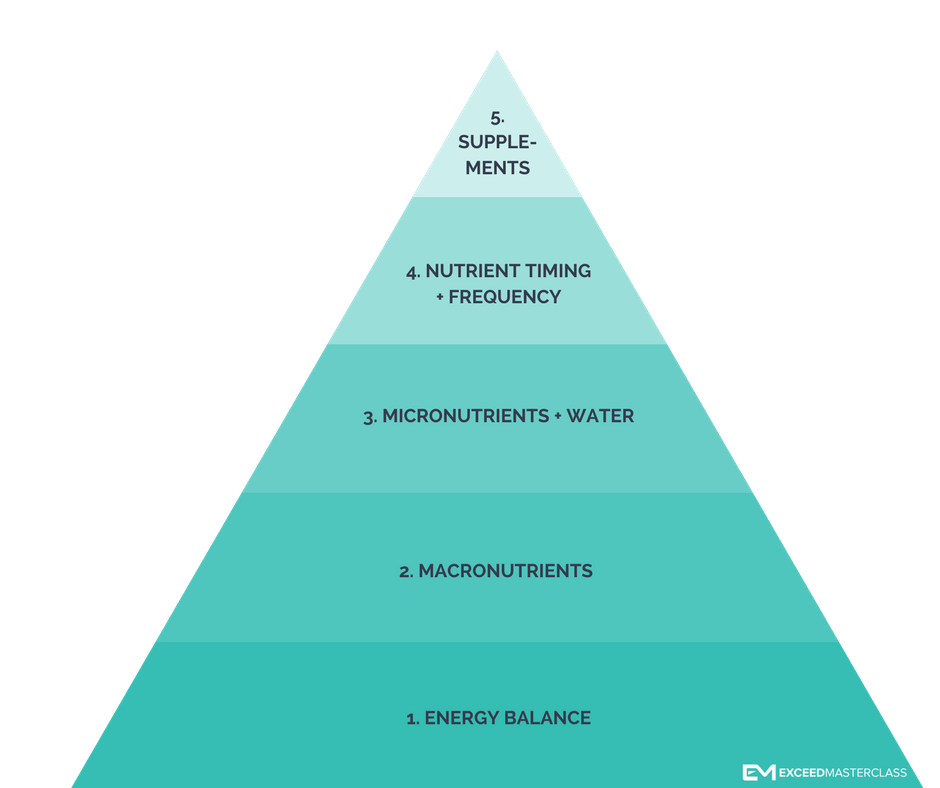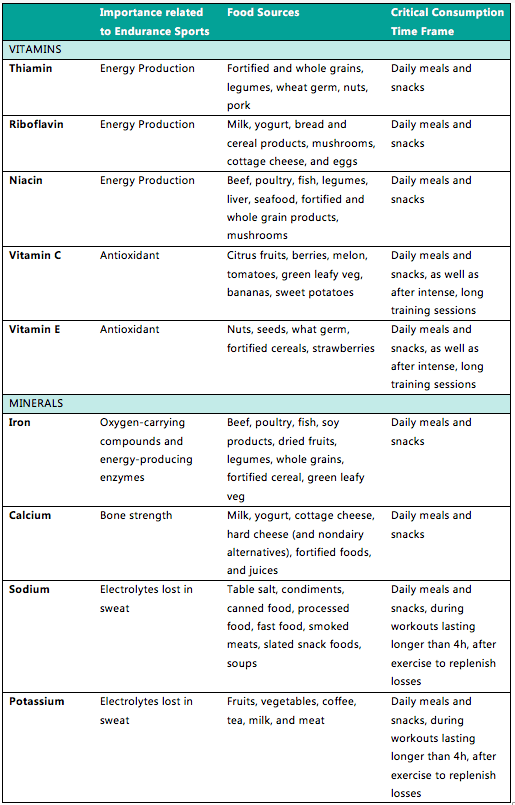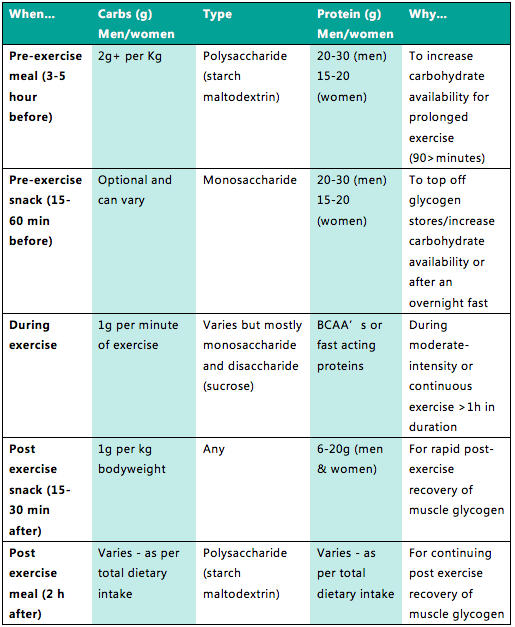Anyone participating in a sport or hobby will be utilizing one of the basic components of physical fitness – endurance.
For those undertaking 30+ minutes of continuous activity, this can be classified as endurance training.
When this extends to 4+ hours of continuous activity, such as an ironman, this is considered ultra-endurance. Endurance fitness is therefore of huge importance to every trainer or athlete.
This article will look at the key dietary requirements for endurance trainers, both in the preparation and training for events.
Before digging in, as a valued reader of the blog, I’d like to extend you an invitation to our upcoming and totally FREE online training workshop:
‘The Proven Nutrition Strategies of Elite Trainers’.
This workshop is for you if you want to finally learn the best nutrition protocols and evidenced-based strategies to help your clients achieve life-changing results.
This workshop is our most complete training on how to make nutrition coaching easy and profitable.
All you need to do to attend is click here to register your free spot.

Introduction
There are two main types of endurance, muscular and cardiorespiratory. Muscular endurance is the ability of muscle or muscle groups to maintain force without fatigue.
Cardiorespiratory endurance is the ability of the cardiovascular system to deliver blood and oxygen to working muscles, reducing fatigue and allowing them to perform better.
The energy required from endurance activities demands large amounts of nutrients, making diet a key factor for athletic performance, recovery and health.
Athletes and trainers who don’t give sufficient attention to this, including some of the finer details, can suffer from fatigue, illness, poor recovery and decreased performance.
In previous articles we have looked to the nutrition pyramid in order to create nutrition plans and programming for clients.
When it comes to doing this nutrition for endurance athletes, the same principles and hierarchy apply, so this is where we will start.

Energy balance
We have already discussed the importance of energy and thus the large amounts of nutrients needed to support endurance performance.
Therefore knowing how to estimate the daily energy needs for an endurance athlete is a critical first step to developing a dietary plan that provides enough calories to meet training and competition energy needs.
With endurance training, it is utilizing the aerobic energy system. As discussed in module 9, energy is created in our cells, giving us the chemical energy known as adenosine triphosphate (ATP).
Although the aerobic system potentially has an unlimited ability to produce ATP, it does so at a much slower rate than anaerobic. This is why endurance events are much slower in speed compared to anaerobic activities. The rate at which ATP is produced is known as aerobic power.
The higher the production of ATP, the higher aerobic power is, equaling higher working power of the athlete. Most endurance athletes train to increase their aerobic power to become better at their sport or hobby.
For endurance athletes, prime importance must be placed on matching energy in vs. energy out. For some endurance athletes this can equate to a daily increase of 2-3 times the calories of their non-exercising counterparts.
To work out the energy requirement for these athletes we do this in exactly the same manner as before.
E.g. Catherine is a 35 year old decathlon runner, who will swim, run and cycle a total of 50-60 miles per week. Her weight is stable at 140 pounds and her primary goal is to increase athletic ability and performance.
We therefore need to calculate her basal metabolic rate (BMR), as in her daily energy expenditure in calories without any contribution from exercise or digestion:
Bodyweight (in pounds) x 10 (multiplier) = 140Ibs x 10 = 1400kcals
We then must account for total daily energy expenditure (TDEE) that includes her BMR, non-exercise associated thermogenesis (NEAT), exercise associated thermogenesis (EAT) and thermic effect of feeding (TEF). We can do this using the below calculation:
We know Catherine is exercising hard 6-7 days per week in order for her to complete that sort of mileage. Therefore -
TDEE = BMR x Activity Level TDEE = 1400kcal x 1.725 = 2415kcal
Unlike for a client that whishes to lose or gain weight, this calculation doesn’t need to be adjusted. However it should be noted that this is just a starting point. What might need further adjusting is the caloric intake based on activity levels on a daily basis.
For example, if Catherine was training each day, and for 2 days of the week her mileage was double that compared to the other days, then calories should be increased on those hard training days.
For example, on rest or recovery days, or days of lower volume of training, calories could be set to the calculated 2400kcals.
But for those 2 days of very hard and long endurance training you may be better using the high activity level multiplier, such as 1.9.
E.g. TDEE = BMR x Activity Level TDEE = 1400 x 1.9 = 2660 kcals
So on days of higher activity, calories could be around 2700 kcal to compensate for this.
What you also must understand is that if you are working with a competitive athlete completing multiple or staged events, their activity level could range from 3-4 (increasing from 1.7-1.9), you need to increase daily calories drastically during those periods of competition.
This can result in high food intake for endurance athletes, which is why so many fall short on such an important nutritional factor.
As nutrition coaches, it’s important for us to make eating large quantities of food as easy as possible by suggesting the best high nutrient foods, meal timings and frequency to make this easier for them.
This is when the benefit of a set nutrition plan can prove advantageous.
Calories during training or competition
In an ideal world the athlete would continuously replace calories lost throughout exercise, so no energy balance was disrupted.
There are a number of factors that make this difficult to do. The number of calories expended varies from sport to sport, person to person, making the calculation of spent calories very difficult to calculate.
There are also restrictions on the athlete such as movement, mental focus and general feasibility during the training or competition too, making nutrient consumption difficult.
For the active athlete it’s therefore important to consider the key factors that will affect his/her performance the most at the time - carbohydrates, fluid and sodium levels.
By focusing on these factors and not overall caloric consumption we can achieve greater performance. If we focus too much on nutrient consumption during exercise, it can lead to digestive system issues, as blood flow is being targeted to the working muscles, not the digestive system.
Therefore the only calorie containing nutrient to consider at this time is carbohydrates, as these are the body’s primary energy source. It is recommended that 1g of carbohydrates, in monosaccharide and disaccharide form, be consumed for every minute of exercise.
E.g. 60 minute run = 60g of fast acting carbohydrates
Calories after training or competition
Many endurance athletes complain of not wanting to eat following intense endurance training or competition, and this is another common mistake they make.
It is recommended that athletes consume 200-300 calories from protein and carbohydrates immediately post exercise. This is to encourage rapid post exercise recovery of muscle glycogen and provide vital amino acids for repair and growth.
A larger meal 1-2 hours post training should follow, supplying more calories, macros, micros and fluids.
Macronutrient requirements
We’ve established that nutrition for endurance athletes will require a higher amount of calories.
With endurance training, this means higher glycogen requirements too, meaning more carbohydrates. Of course protein and fat play a vital role in these athletes’ diets too, and they require a balanced diet just as much as any other person.
Let’s break these recommendations down some more for each of the macronutrients.
Carbohydrate requirements
Carbohydrates play a key role in an endurance athlete’s diet, as they act as the primary source of energy.
Long duration and repetitive activity as seen in endurance exercise places high-energy demands on the individual. To further aggravate this, carbohydrate stores are limited in the body.
This means the time to exhaustion during endurance exercise, is directly related to stored glycogen levels in the muscles. When liver and muscle glycogen stores are depleted from endurance training, the athlete experiences increasing perception of fatigue.
This is also known as ‘hitting the wall’ or ‘bonking’.
Carbohydrates are therefore vital to an athlete’s performance and recovery, thus should not be underestimated in this field.

Calculating Carbohydrate Requirements
The current recommendations for daily carbohydrate intake for athletes engaged in moderate or heavy endurance training or competition is 5-12g/kg per day.
If we use Catherine as our example again, her daily intake could be:
140 pounds ÷ 2.2 = 63.6 kg of bodyweight
63.6 x 5-12g of carbs per day = 318-763g of carbohydrates per day
As you can see, this is not only a large amount of carbs to consume each day, but a wide range too. Here are some suggestions on how to break down further:
5-7g/kg if training 1 hour per day
8g/kg if training 2 hours per day
10g/kg if training 3-4 hours per day
10-12g/kg if training 4-6 hours per day or more
Another consideration must be how this intake fits into an overall balanced diet. It’s important to always compare carbohydrate intake to the total caloric intake. Endurance athletes should generally aim for 50-65% of their total calories from carbohydrates.
In our example, Catherine, her total daily calories was 2400kcals. Therefore around 300g of carbohydrates per day would provide 50% of total calories, making 5-6g/kg of carbs per day her ideal to retain a balanced diet along with high carbohydrate intake.
Carbohydrate Loading
Carbohydrate loading is a traditional approach used by many athletes to energise their systems and fully maximize muscle glycogen before the event. This is to ensure peak performance.
This loading phase is typically completed alongside a reduced training load, also called ‘tapering’, to rest the muscles and let them fully recover.
This protocol is used around 2-5 days prior an event.
The daily carbohydrate recommendations go from the 50-60% of total calories from carbohydrates to 65-70%. This is usually 8-10g/kg of carbohydrates per day, which usually equates to 500-600grams daily.
As previously mentioned, that is a lot carbohydrates, so specific recommendations should be suggested.
To reduce any weight gain or sluggishness from increased carb intake, calories should remain the same. It’s therefore possible to temporarily bring fats down to support such high levels of carbohydrates.
Protein should stay high for muscle repair and retention.
To reduce any digestive system issues the use of nutrient dense foods is advisable, including juices, gels and fluids to support the carb load.
Remember this information is for starting purposes only- get to know your client and what they respond best to as an individual and tweak as required.
Carbohydrates Prior Endurance Exercise
Research shows that carbohydrate intake in the hours and minutes leading up to activities lasting over 2 hours, can have positive results on increased performance.
This works by increasing blood sugar levels, sparing muscle and liver glycogen stores more effectively. This is a common factor missed by athletes, particularly those who exercise early in the morning.
Studies have shown that an intake of carbohydrates prior to training can be from anywhere between 1-4 hours, and the greater the amount consumed, the more time should be left.
It has been suggested that athletes could consume greater than 2g of carbohydrates per kg body weight (2g/kg) prior to endurance exercise for maximum performance benefits.
Carbohydrates Prior During Exercise
As previously mentioned, in order to maintain blood glucose for oxidation and continued energy production, carbohydrates should be consumed throughout endurance exercise.
Many athletes do well with 1g carbohydrates per minute of activity, while some can do well with 2g per minute.
Carbohydrates Post Endurance Exercise
Carbohydrates are critical to optimize recovery from endurance exercise and to replenish muscle glycogen stores.
Athletes should aim to consume 1g per kg bodyweight of carbohydrates within 15-30 minutes following exercise.
Protein requirements
As expected, protein requirements are important for endurance athletes just like carbohydrates.
Research shows that this intake should be higher than what many athletes will actually consume, with general recommendations being 1.2-1.4g/kg a day.
This intake is similar to athletes that train anaerobically such as for strength and power. Although aerobic training isn’t about building muscle mass or strength, it is believed that repeated contractions and impact activities can increase protein breakdown during endurance exercise.
Also protein synthesis has been shown to increase following endurance training, placing further need for adequate daily protein intake.
The benefits from this are clear with many athletes reporting improved recovery and muscle maintenance. Of course these recommendations are just starting points, and some clients may see further benefits from a higher protein diet, such as 2g/kg per day.
This should be based on the overall caloric intake of the diet, how intensely and frequent they train and whether they want to gain or lose weight.
Protein Prior To Endurance Training
We previously established that carbohydrates are important in the 1-4 hours prior to exercise, and studies show that protein should be included here too. Protein intake prior to exercise can help maintain energy levels, increase levels of satiation and provide ample levels of amino acids.
To reap the most benefit from this research supports that intake of protein should be taken alongside carbohydrates and within 1-3 hours prior to exercise.
Protein During Endurance Training
The magnitude of protein usage during endurance exercise is an important consideration for athletes. Research has shown that the body will excrete certain amino acids from muscle and oxidize and metabolize them during training.
These studies have shown that BCAA’s have the greatest potential and benefits for athletes at this time.
The consumption of BCAA’s, - leucine, valine and isoleucine may therefore promote improved athletic performance. It’s not fully known why this occurs, and some studies suggest they can be used for energy, insulin stimulation for heightened glycogen synthesis and/or suppression of central fatigue.
Protein at this time should be easily digested, and supplementation of BCAA’s is a popular choice.
Protein Post Endurance Training
Protein will aid in the recovery process for athletes, but not as much as carbohydrates for endurance exercise.
Research has suggested that by consuming carbohydrates with protein post exercise, athletes will see greater glycogen replenishment than with carbohydrates or protein alone.
A further benefit is that the increased levels of amino acids will aid recovery and muscle repair.
Protein should be consumed with fast acting carbohydrates, 15-30 minutes post exercise, and these too should be fast and easily digested e.g. whey protein powder.
Approx. 6-20g of protein post exercise is the ideal. Consumption of protein in subsequent meals should be sufficient to continue the recovery process and to meet daily requirements.
Fat requirements
Despite a high requirement for protein and carbs in an endurance athlete’s diet, fat is also a necessary nutrient to be consumed.
It doesn’t need to be as high an intake as it offers very little increase in athletic performance.
Occasionally some sports nutritionists and coaches will use a ‘fat loading’ phase which is a period of time, usually 3- 5 days prior an event, to drastically increase calories from fat.
The goal is to encourage the body to use more body fat for energy, as we know stored glucose is a limiting factor to endurance athlete’s performance. However research doesn’t fully support the effectiveness of this theory.
Athletes can and should have fat in their diets, providing it doesn’t replace the carbohydrates and protein required for success in endurance training.
Therefore when calculating fat requirements, both protein and carbs take precedence over fat.
The typical requirements are 20-30% of the diet from fat, and this will aid total caloric intake, provide vitamins and minerals, and essential fatty acids in the diet.
There are also no essential requirements for the use of fat prior, during or immediately post endurance exercise - simply meet daily targets.
Micronutrient requirements
Due to the demands of endurance training, its depleting nature and the stress it puts on the body, endurance athletes can see benefits from including high levels of certain vitamins and minerals.
B Vitamins
Thiamin, riboflavin and niacin are the key B vitamins for endurance athletes. B vitamins are potent for energy production so increased daily levels are important. The intake of high B vitamin foods is recommended with possible supplementation.
Vitamin C & E
These are potent antioxidants that reduce oxidative damage. They can also work in synergy with one another, making their benefits greater when combined.
Vitamin C should be consumed at 250-500mg per day and vitamin E at 100-300mg per day. This can be achieved through a diet including ample amounts of fruit and veg, but may also be supplemented.
Iron
Iron is a common deficiency and endurance athletes are at greater risk of this, as they lose more via urine and sweat.
Iron aids in transporting and utilizing oxygen, and is important for maximum performance. A diet rich in iron foods should be sufficient.
Calcium
Aside from supporting bone strength, calcium is important to help produce ‘fibrin’, a protein responsible for the structure of blood clots.
It is also used to aid muscle contraction and relaxation, movements essential for endurance athletes to maintain at peak performance for a time.
Calcium also activates several enzymes that affect the synthesis and breakdown of muscle and liver glycogen, a main energy source for endurance athletes.
Adequate levels of calcium can be achieved through the diet, but supplementation should be used if the athlete is not reaching RDA levels.
Sodium & Potassium
Both sodium and potassium are important electrolytes to endurance athletes. Electrolytes aid the interchange and flow of nutrients into and out of cells, and are responsible for nerve impulses and muscle contraction.
They are commonly lost in sweat, making a greater demand for them to ensure optimal performance in athletes.
Most people achieve sufficient sodium in the diet, but a small pinch of salt added to meals may also prove beneficial. Potassium can be improved from an increased amount of fruit, vegetables and dairy products.
Theses electrolytes are commonly added to sports beverages, which can be used during times of exercise.

Fluid requirements
We already know the importance of water from our previous article, and that it is the most important nutrient and is critical to life.
For endurance athletes, the functions of water in the body plays further important roles such as regulating body temperature (heat regulation) via maintenance of blood plasma volume and reduces the amount of oxygenated blood pumped to working muscles.
We also know that proper hydration leads to optimal endurance and performance.
Athletes are at greater risk of dehydration from prolonged exercise and must therefore continually monitor their fluid intake through the day to control this. Even a 1-2% in dehydration is common and often unavoidable during endurance exercise.
On top of staying optimally hydrated daily, athletes should also ‘weigh in’ before exercise. For every pound in weight lost after the event, it should be replaced by 500ml of water, with no more than 400-800ml per hour.
If weight gain occurs, athletes should hydrate less and monitor their hydration levels.
Fluid intake and hydration levels are highly individual, so the responsibility for optimal hydration falls in the hands of the athlete, and only they know how to ensure their own optimal hydration day to day.
Nutrient timing & frequency
Meal frequency is a personal preference and this still remains true for nutrition for endurance athletes.
Due to potential high levels of food intake and in particular carbohydrates, smaller and regular meals appear to work well for many. This helps break up the daily calories to reduce any bloating or sluggishness from larger meals.
We’ve already covered the most important factors for nutrient timing for endurance athletes, but it has been summarized below for you.

Supplements
We have mentioned a number of important macro and micronutrients that should be included in larger quantities in an endurance athlete’s diets.
Although these can all be obtained from the diet, supplementation can be effective to ensure daily allowances are being met.
Performance supplementation has also extended into the endurance world, and there are a number of options for athletes to now use.
Providing they are of high quality with effective and safe ingredients, they can be used to boost performance.
Particular supplements that have been created around the exercise window, to aid the delivery of nutrients and natural performance enhancers, can provide additional benefits that are worth considering.
Become an elite-level nutrition coach
My team and I have just finished up creating a brand new online training workshop called 'The Proven Nutrition Strategies of Elite Trainers.'
Best part? It costs you nothing. This is your official invite - all you need to do to attend is click here to register.
This free nutrition course is for you if you want to finally learn the best nutrition protocols and evidenced-based strategies to help your clients achieve life-changing results.
Join me and I’ll walk you through the exact steps you need to take in order to get incredible client results, boost your confidence and build your business with proven nutrition coaching strategies.

